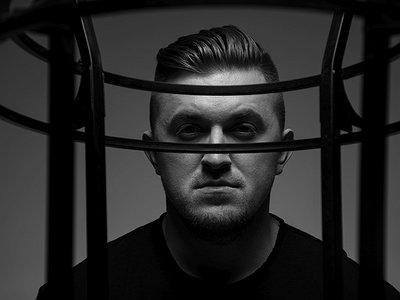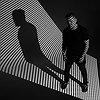Part 3
How is playing live and writing music in the studio connected? What do you achieve and draw from each experience personally? How do you see the relationship between improvisation and composition in this regard?
Answering this question, it will probably be honest to say and emphasize the fact that I am a DJ so I play the already composed tracks and don’t perform live. Only when I take my sampler on tour with me do I improvise in some ways but in general, it’s all about the prepared riffs. So there’s no “live” element really in my gigs. I mean, I don’t play any instruments live. But of course, the connection between writing music in a studio and playing live is a colossal experience. Being an actively touring DJ, I gain great advantage from having an opportunity to understand clearly while I’m sitting in my studio well before the show how certain parts of the track, certain hooks will work on a dancefloor. Like, if I make this kind of exit from the drop, then the feedback will be such and such, or if I do something different, then the crowd might not respond that well. So having an opportunity to perform on stage on a constant basis and remain in contact with the audience, observing closely how certain parts of the track work with the crowd and seeing what could be added or removed, all of this, of course, is a very useful and effective advantage. And this reflects on my production, too. So there’s not much improvisation in my performance on stage, maybe just some in terms of the technique of mixing tracks or adding some loops to them, etc. But the very opportunity to gain more and more experience in communicating with the crowd is a real plus in writing new tracks.
How do you see the relationship between the 'sound' aspects of music and the 'composition' aspects? How do you work with sound and timbre to meet certain production ideas and in which way can certain sounds already take on compositional qualities?
I can’t say that in techno music I focus too much on the composition aspects. We have everything built around groove, some unique sound. So the bidding is done more on finding that peculiar sound, synthesizing some presets for plugins, keyboards, so I’ve been paying less attention to composition in my creative work over the past years. But again, I should note that we are now witnessing a certain return “back to the roots” of classic old school trance and techno so during breaks in my tracks you have to create interesting melodies and work seriously on this part.
Talking about the peculiarities of my work with sound, with the production and ideas, I would probably describe it this way: There is a key note in the track. And around this key, root note, I select various sounds, try to play some parts on a keyboard and figure out whether I’m hooked with the result or not. If I find some interesting sound in some library or elsewhere but it’s in a different key, I pitch it to the right key to make it fit the main note and the whole composition. In general, I would say the whole process resembles writing a letter using letters cut out from magazines and newspapers. That’s probably how I could best describe the kind of techno that I produce.
Our sense of hearing shares intriguing connections to other senses. From your experience, what are some of the most inspiring overlaps between different senses - and what do they tell us about the way our senses work? What happens to sound at its outermost borders?
I totally agree with you here. I believe that in my work, in my DJ performances the people dealing with special FX stuff in clubs are of great importance. This is about LJs, VJs, and I see a key to a great party in a harmonic connection between the music I play, my own work, and the work of the people mentioned. That’s because you can enhance the effect of sensing and enjoying the music by skilfully managing the means you have at your disposal at the club, I mean lights and screens for VJing. If those managing these assets are qualified enough, it always doubles or even triples the crowd’s response to my performance. It is probably a bit unfair that it’s only the DJs who are hailed by club-goers, while the people behind their successful gigs at clubs are forgotten.
I had this very interesting experience some 6 or 7 years ago when VJing was not that popular in Ukraine. I performed at Kazantip Festival in Crimea, playing on a stage where large screens had been installed and a VJ was working alongside, And I still remember being enchanted by a combination of music and that melancholic type of visual. This whole thing was rather mesmerizing to me, a real hypnotic experience, indeed. Since then, I’ve been aware of a colossal effect VJing can deliver. So in our industry, quality VJing and the ability to exploit properly our visual senses could yield great dividends to artists.
Art can be a purpose in its own right, but it can also directly feed back into everyday life, take on a social and political role and lead to more engagement. Can you describe your approach to art and being an artist?
I have turned art into my profession and I try to treat professionally everything I do in this regard. First of all, I pay great attention to strategic planning, to what I write, produce, and release. My radio shows, too, and other things I do as an artist. I would probably refer to myself as a market expert … Unfortunately, or fortunately (who knows?) the realities of today shows us that many young artists drag on this aspect of their work and thus they fail to achieve the highest results despite setting themselves great goals. Maybe, my approach is a bit pragmatic but again, I try to first analyse deeply today’s market and build up certain goals for how I would like to position my work and where I’d like to perform. So, based on these goals and based on the correctly defined market, I make my product. It’s a real-life approach, really. But that’s how it is. You should feel very precisely for whom you produce your music and what is your aim. If you treat this issue as a professional, you will see a corresponding outcome.
It is remarkable, in a way, that we have arrived in the 21st century with the basic concept of music still intact. Do you have a vision of music, an idea of what music could be beyond its current form?
Come to think about it, that’s actually the way it is. The very concept of music has not changed. Moreover, its structure has basically remained unchanged for many centuries. Perhaps, the shape of it, the instruments used, and the technique are the things that are constantly changing, especially in the recent years, as new techniques and new sounds emerge, then burn out as a candle and get substituted by new trends. But the very concept remains the same. As for techno music, I am seeing a clear trend to returning to the sound of the 1990s, and yet another time I confirm to myself that anything new is something old that has been well forgotten. This idea is really relevant for techno music nowadays. It’s hard for me to judge what the music will be like in the future. I’ve never made any type of forecasts in this regard. But I suggest that the rule of an eternal circle will remain relevant. Of course, it would be interesting to look ahead and see what the trends will be like in the future. Now we hear that melodies from classic trance, classic techno are returning. So we’ll see where it leads us. Being an active participant in the techno process and a focused observer, I am just as interested to see it as you are. As for the future forms of delivering music, some new types of live performances, I think that most probably the rapidly developing technology will bring something new to us and maybe within just a few years, we will see some extraordinary hi-end live shows. However, we see that anything that startles the market as a sudden explosion may come in fast but it will also be forgotten soon, while the very concept of music remains the same. So I think that’s the way it will go, at least in my lifetime.







